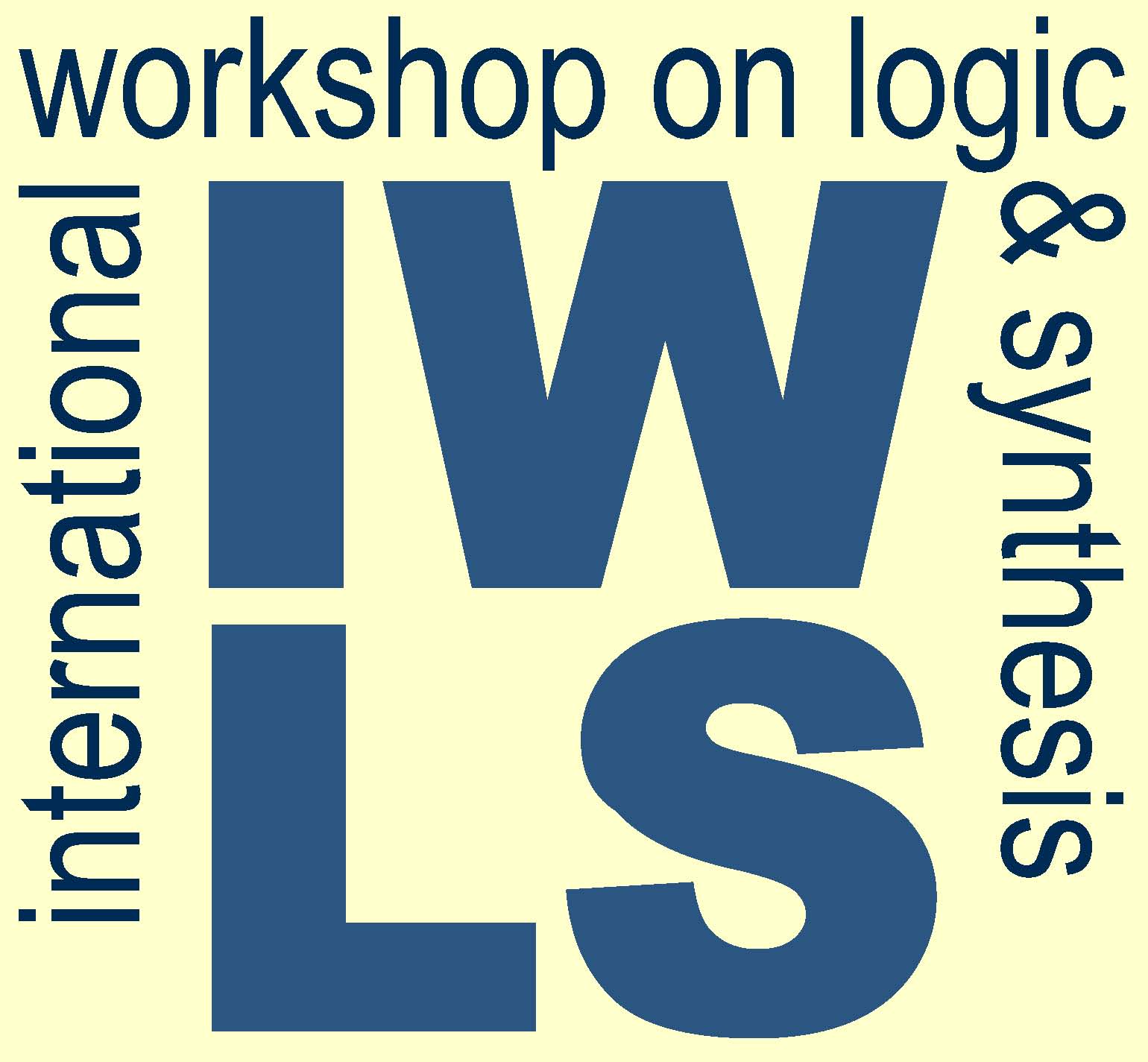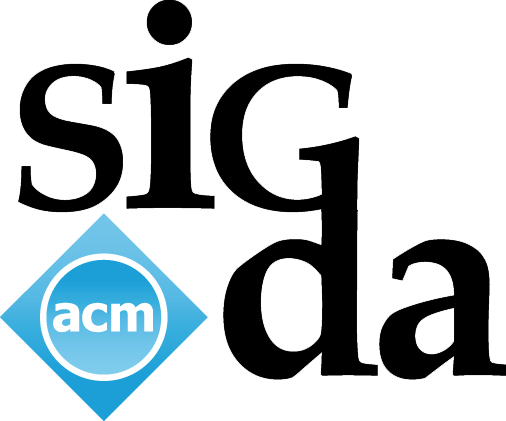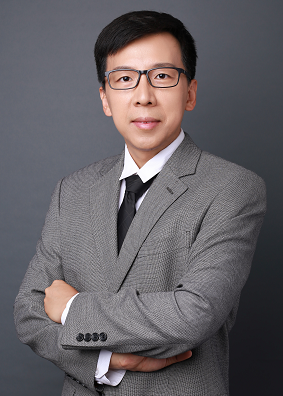
2022 |
31st International Workshop on Logic & Synthesis July 18 – 21, 2022 Virtual Conference |
Our sponsors



|




|
The International Workshop on Logic and Synthesis is the premier forum for research in synthesis, optimization, and verification of integrated circuits and systems. Research on logic synthesis for emerging technologies and for novel computing platforms, such as nanoscale systems and biological systems, is also strongly encouraged. The workshop encourages early dissemination of ideas and results. The workshop accepts complete papers highlighting important new problems in the early stages of development, without providing complete solutions. The emphasis is on novelty and intellectual rigor.
Topics of interest include, but are not limited to: hardware synthesis and optimization; software synthesis; hardware/software co-synthesis; power and timing analysis; testing, validation and verification; synthesis for reconfigurable architectures; hardware compilation for domain-specific languages; design experiences. Submissions on modeling, analysis, and synthesis for emerging technologies and platforms are particularly encouraged.
The workshop format includes paper presentations, posters, invited talks, social gatherings, and recreational activities. Accepted papers are distributed exclusively to IWLS participants.
Check out our call for papers.
| Technical Program |
The technical program consists of 18 regular talks, 1 short presentation, 3 keynotes and 1 special session.
| Best Student Paper Nominations |
|
Paper #10: An Automated Testing and Debugging Toolkit for Gate-Level Logic Synthesis Applications (Best Student Paper Award) Siang-Yun Lee (EPFL, Switzerland), Heinz Riener (Cadence Design Systems, Germany) and Giovanni De Micheli (EPFL, Switzerland) |
|
Paper #15: Language Equation Solving via Boolean Automata Manipulation Wan-Hsuan Lin (National Taiwan University, Taiwan), Chia-Hsuan Su (National Taiwan University, Taiwan) and Jie-Hong Roland Jiang (National Taiwan University, Taiwan) |
|
Paper #16: Partial Equivalence Checking of Quantum Circuits Tian-Fu Chen (National Taiwan University, Taiwan), Jie-Hong Roland Jiang (National Taiwan University, Taiwan) and Min-Hsiu Hsieh (National Taiwan University, Taiwan) |
|
Paper #26: Quantifier Elimination in Stochastic Boolean Satisfiability Hao-Ren Wang (National Taiwan University, Taiwan), Kuan-Hua Tu (National Taiwan University, Taiwan), Jie-Hong Roland Jiang (National Taiwan University, Taiwan) and Christoph Scholl (University of Freiburg, Germany) |
| Best Presentation Award |
|
Polynomial Formal Verification of Approximate Adders Martha Schnieber (University of Bremen, Germany), Saman Froehlich (University of Bremen, Germany) and Rolf Drechsler (University of Bremen, Germany) Talk @Youtube |
| Programming Contest - Top-3 Teams |
|
1st team: EPFL (École polytechnique fédérale de Lausanne)
Andrea Costamagna, Siang-Yun Lee, Alessandro Tempia Calvino, Hanyu Wang, Mingfei Yu, Professor Giovanni de Micheli Talk @Youtube |
|
2nd team: Team UCB (University of California, Berkeley)
Yukio Miyasaka Talk @Youtube |
|
3rd team: team TUW (Technische Universität Wien)
Franz Reichl, Friedrich Slivovsky, Stefan Szeider Talk @Youtube |
| Keynotes |

|
Agile Spatial Hardware Specialization
Tensor algebra finds applications in various domains, and these applications, especially when accelerated on spatial hardware accelerators, can deliver high performance and low power. Spatial hardware accelerator exhibits complex design space. Prior approaches based on manual implementation lead to low programming productivity, rendering thorough design space exploration impossible. We propose a series of works that can formally represent the hardware dataflow and generate the hardware automatically. |

|
High-Level Synthesis of Dynamically Scheduled Circuits
High-level synthesis (HLS) tools generate digital hardware designs from high-level programming languages (e.g., C/C++) and promise to liberate designers from low-level hardware description details. Yet, HLS tools are still acceptable only for certain classes of applications and are criticized for the difficulty of extracting the desired level of performance: generating good circuits still requires tedious code restructuring and hardware design expertise. In this talk, I will present a new HLS methodology that produces dynamically scheduled, dataflow circuits out of C/C++ code; the resulting circuits achieve good performance out-of-the-box and realize behaviors that are beyond the capabilities of standard HLS tools. I will outline mathematical models to optimize the performance and area of the resulting circuits, as well as techniques to achieve characteristics that standard HLS cannot support, such as out-of-order memory accesses and speculative execution. These contributions redefine the HLS paradigm by introducing characteristics of modern superscalar processors to hardware designs; such behaviors are key for specialized computing to be successful in new contexts and broader application domains. |

|
Practice on Performance Autotuning in AI Compute Chip
Modern AI compute SOCs have abundant computation cores, interconnects & high-bandwidth memory (HBM) resources. When facing enormous different neural network architectures, how to program AI compute chips to make full use of the system resources becomes challenging. In this talk, I will share an automated code generation framework "Autotuning through design space pruning & schedule templates" to program a commercial AI compute chip to achieve improvements in both accelerator performance and coding efficiency. |
| Registration |
Instructions available!
The workshop will be held on Zoom and has no formal registration.
Please send an email to iwls2022.join@gmail.com to receive your meeting invitations.
| IWLS 2022 Programming Contest |
Contest submission closed.
The goal of this year's contest is to synthesize small circuits for completely-specified multi-output Boolean functions represented using truth tables. Participants should find competitive solutions for different benchmarks using a variety of novel break-through methods (e.g., search and enumeration, new decomposition, etc.).
To participate, check out the contest description and download the benchmark.
Please submit your solution sending an email to iwls2022.contest@gmail.com no later than June 20, 2022 July 4, 2022 July 11, 2022.
Contest award:
- 1st Place Award: $1,000 USD
- 2nd Place Award: $750 USD
- 3rd Place Award: $500 USD
| Important Dates |
Paper submission closed.
| Paper abstract submission: | April 25, 2022 | ||
| Full paper submission: | May 2, 2022 @ 11.59pm Anywhere on Earth | ||
| Notification of acceptance: | June 24, 2022 | ||
| Final version due: | July 06, 2022 |
| Submission Instructions |
Only complete papers with original and previously unpublished material are permitted. Submissions must be no longer than 8 pages, double column, 10-point font. Accepted papers are distributed only to IWLS participants.
Awards:
- Best Student Paper Award: $1,000 USD
- Best Presentation Award: $1,000 USD
EasyChair IWLS 2022 submission page
| Organizing Committee |
| General Chair | Luca Amaru | Synopsys, USA | ||
| Program Committee Chairs | Eleonora Testa / Valentina Ciriani | Synopsys, USA / University of Milan, IT | ||
| Program Contest Chairs | Alan Mishchenko / Satrajit Chatterjee | University of California Berkeley, USA / Google, USA | ||
| Special Session Chair | Cunxi Yu | Univerisy of Utah, USA | ||
| Finance Chair | Zhufei Chu | Ningbo University, China | ||
| Proceedings Chair | Walter Lau Neto | Univerisy of Utah, USA | ||
| Publicity Chair | Augusto Neutzling | Cadence, UK | ||
| Virtual Chair | Giulia Meuli | Synopsys, IT |
| Technical Program Committee |
| Luca Amaru | Synopsys, USA | |
| Anna Bernasconi | Università di Pisa, Italy | |
| Vinicius Callegaro | Siemens EDA, USA | |
| Sat Chatterjee | Google, USA | |
| Zhufei Chu | Ningbo University, China | |
| Valentina Ciriani | Università degli Studi di Milano, Italy | |
| Stephan Eggersglüß | Siemens EDA, Germany | |
| Petr Fišer | CTU, Czech Republic | |
| Jie-Hong Roland Jiang | National Taiwan University, Taiwan | |
| Victor Kravets | IBM, USA | |
| Walter Lau Neto | University of Utah, USA | |
| Giulia Meuli | Synopsys, Italy | |
| Alan Mishchenko | UC Berkeley, USA | |
| Augusto Neutzling | Cadence Design System, UK | |
| Weikang Qian | Shanghai Jiao Tong University, China | |
| Andre Reis | UFRGS, Brazil | |
| Heinz Riener | Cadence Design System, Germany | |
| Tsutomu Sasao | Meiji University, Japan | |
| Mathias Soeken | Microsoft, USA | |
| Eleonora Testa | Synopsys, USA | |
| Tiziano Villa | Università degli Studi di Verona, Italy | |
| Robert Wille | Johannes Kepler University, Austria | |
| Cunxi Yu | University of Utah, USA |
| Benchmarks |
The IWLS community maintains a set of logic synthesis benchmarks (IWLS'05 and EPFL), available in various formats.
| Mailing List |
Subscribe to the IWLS mailing list. (The list is hidden and only its administrator can post to it.)
| Links to Past Workshops |
IWLS 2021: July 19 - July 22, 2021, Virtual
IWLS 2020: July 27 - July 30, 2020, Virtual
IWLS 2019: June 21 - June 23, 2019, San Francisco, California
IWLS 2018: June 23 - June 24, 2018, San Francisco, California
IWLS 2017: June 17 - June 18, 2017, Austin, Texas
IWLS 2016: June 10 - June 11, 2016, Austin, Texas
IWLS 2015: June 12 - June 13, 2015, Mountain View, California
IWLS 2014: May 30 - June 1, 2014, San Francisco, California
IWLS 2013: June 7 - June 8, 2013, Austin, Texas
IWLS 2012: June 1 - June 3, 2012, Berkeley, California
IWLS 2011: June 3 - June 5, 2011, San Diego, California
IWLS 2010: June 18 - June 20, 2010, Irvine, California
IWLS 2009: July 31 - August 2, 2009, Berkeley, California
IWLS 2008: June 4 - 6, 2008, Lake Tahoe, California
IWLS 2007: May 30 - June 1, 2007, San Diego, California
IWLS 2006: June 7 - 9, 2006, Vail, Colorado
IWLS 2005: June 8 - 10, 2005, Lake Arrowhead, California
IWLS 2004: June 2 - 4, 2004, Temecula Creek, California
IWLS 2003: May 28 - 30, 2003, Laguna Beach, California
IWLS 2002: June 4 - 7, 2002, New Orleans, Louisiana
IWLS 2001: June 12 - 15, 2001, Lake Tahoe, California
IWLS 2000: May 31 - June 2, 2000, Dana Point, California
| Related Conferences |
ICCAD: International Conference on Computer-Aided Design
DATE: Design, Automation and Test in Europe
ASPDAC: Asia and South Pacific Design Automation Conference
DAC: Design Automation Conference
ISPD: International Symposium on Physical Design
ISLPED: International Symposium on Low Power Electronics and Design
IWBDA: International Symposium on Bio-Design Automation